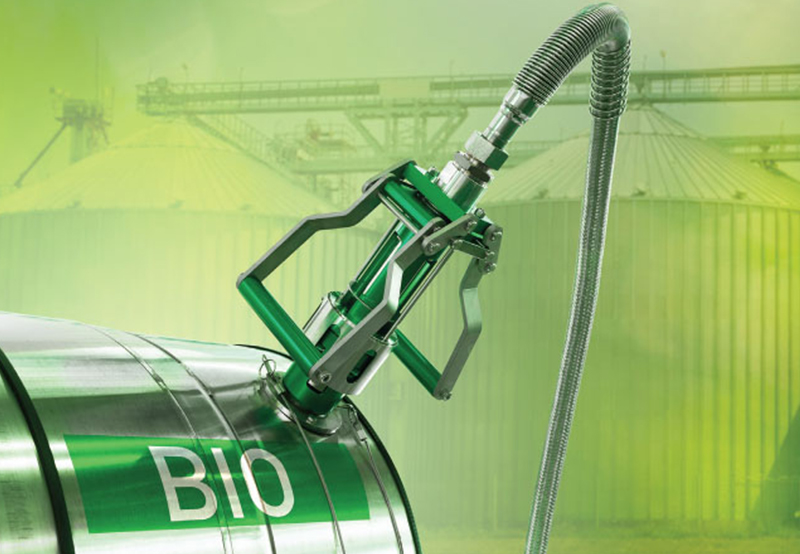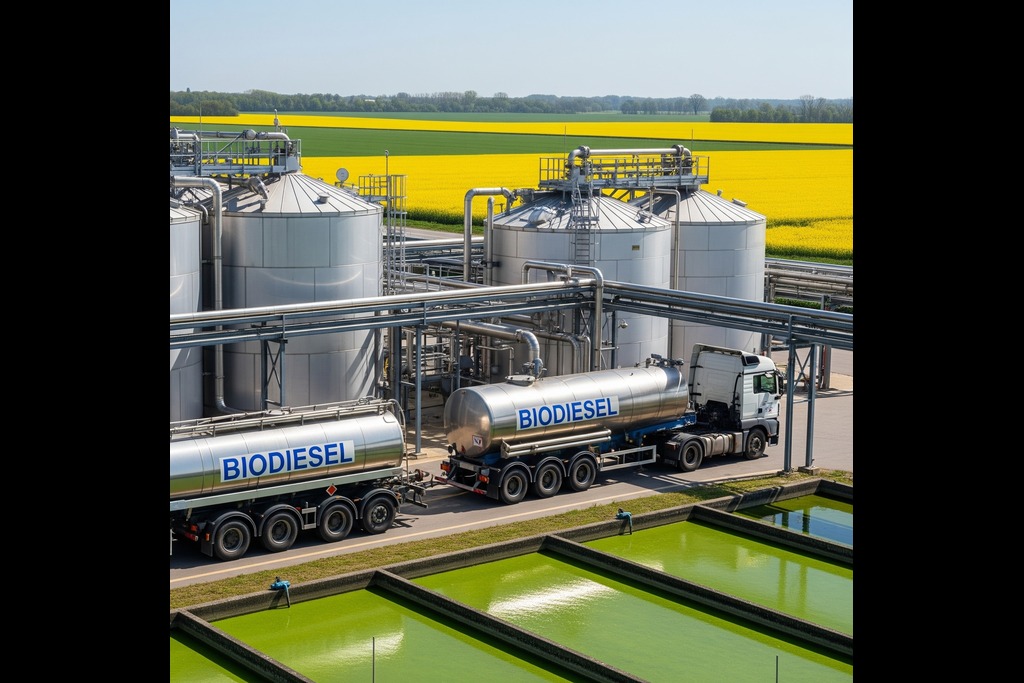The Impact of Biodiesel, Ethanol, and CBG on Sustainable Energy: A Cleaner Future
As the world struggles to decrease its reliance on fossil fuels and stop climate change, the quest for renewable, clean energy sources is more important than ever. At the top of the list are alternatives such as biodiesel, ethanol, and Cannabigerol (CBG), all working towards a cleaner, greener tomorrow in their own way. This blog delves into the advantages of these renewable biofuels and how they are all working together to bring us a sustainable energy future.

Understanding Renewable Biofuels
Renewable biofuels, which are derived from organic sources such as plants, algae, and wastes, are popularly seen as a good alternative to traditional fossil fuels. Biofuels can reduce greenhouse gas emissions, save the environment, and curb the use of fossil fuel drilling. Of these renewable biofuels, biodiesel, ethanol, and CBG are leading the charge in seeking sustainability.
Biodiesel: An Eco-Friendly Alternative to Diesel
Renewable fuels such as biodiesel (organic oils and fats) have been considered alternatives to traditional petroleum diesel since it has long been seen as potential replacement fuels. Biodiesel environmental impact is significantly lower than that of fossil fuels. Biodiesel, when utilized in diesel engines, produces less of the harmful emissions such as carbon monoxide, particulate matter and hydrocarbons. In addition, its carbon dioxide emission is mostly neutral because carbon emitted during combustion is absorbed by the plants that yield oils used to synthesize biodiesel. This cycle of carbon is much more sustainable compared to fossil fuels that cause the release of the antique carbon that is preserved in the crust of the earth.
In addition to reducing harmful emissions, biodiesel provides the benefits of CBG, which is often incorporated into the production of biofuels. CBG is a non-psychotropic cannabinoid that is currently being investigated in its capabilities to improve the quality of many different fuels such as biodiesel. Studies have shown that CBG has the ability to enhance combustion efficiency, decrease engine wear, and therefore, biodiesel is even more appealing as an alternative source of renewable energy.
Ethanol: Powering the Future with Plants
Ethanol fuel production involves converting plant materials, such as corn, sugarcane, and even agricultural waste, into alcohol that can be used as an alternative to gasoline. Ethanol, the renewable biofuel, serves the important role of making transportation more environmentally friendly, which is one of the biggest sources of greenhouse gases in several countries.
Ethanol’s renewable biofuels classification comes from its ability to be produced sustainably from plants that grow annually, absorbing carbon dioxide from the atmosphere as they grow. The implication of this is that the life of ethanol fuel can be regarded as carbon neutral to a large extent, thus its place in moving toward the cleaner and greener world.
The other advantage of ethanol is that it can be mixed with gasoline in any proportion resulting in a mixture of fuel such as E85 (85 percent ethanol and 15 percent gasoline). These fuels based on ethanol can easily be utilized in the current internal combustion engines with minimum changes hence a ready solution on how to subsequently lower the dependency we have on fossil fuels.
CBG: The Emerging Biofuel with Unmatched Potential
Cannabigerol (CBG) is the plant that has been traditionally recognized as medicinally inclined but in recent times it is also being considered as having a future in the world of biofuel. CBG is one such cannabinoid and is a renewable biofuel that is obtained through the sanitized hemp and other cannabis plants and it is much more than the wellness industry. Transformed into the biofuel, CBG portrays a positive outlook and can enhance successful combustion performance, minimized emissions, and enhanced performance of engines.
The benefits of CBG in biofuel applications are being studied in various research initiatives. The prospect of using CBG to increase the stability and energy density of biofuels gives it a high degree of desirability when it comes to the next-generation biofuels. CBG-derived fuels might provide advantages over fossil-based products that are more environmentally friendly and are a source of sustainable agricultural activities (hemp farms).
Replacing Fossil Fuels: The Transition to a Cleaner Future
The push towards the adoption of biodiesel, ethanol, and CBG is also underpinned by the growing concern to lessen the overall dependence of the world on fossil fuels. Fossil fuels that were the backbone of the till now industrial development, come with a serious cost to the environment. The mining, processing, and combustion of such fuels causes several releases of a huge proportion of greenhouse gases like carbon dioxide (CO2), methane, and nitrous oxide, that trigger climate change and air pollution.
By replacing fossil fuels with biofuels like biodiesel, ethanol, and CBG, we can significantly cut down on the emissions that contribute to global warming. Biofuel realization has not only solved the issue of clean energy but also made a country energy independent and boosts local economies due to the creation of jobs within agriculture, manufacturing, and renewable energy sources.
Replacing Fossil Fuels: The Transition to a Cleaner Future
Both of these biofuels present different benefit opportunities in the quest of finding sustainable sources of energy. Now allow us to examine in some detail their separate advantages:
1. Biodiesel
- Reduced Carbon Footprint: Biodiesel has the benefit of adding a reduced carbon footprint to its reduction due to the fact that biodiesel is produced using renewable plant-based resources.
- Low Emissions: Biodiesel is less emitting because it lowers emissions of toxic substances such as carbon monoxide, particulate pollution and hydrocarbons and is, therefore, cleaner beneath gasoline-based diesel.
- Energy Independence: Countries can switch to biodiesel to substitute petroleum diesel and limit their reliance on imported oil and stimulate domestic power generation.
2. Ethanol
- Sustainable Production: The crops used to produce ethanol including corn and sugarcane are renewable and therefore gasoline has a renewable alternative in ethanol.
- Carbon-Neutral: The ethanol life cycle is mainly carbon-neutral because the plants that are utilised to make ethanol consume carbon dioxide by photosynthesis just like any other plant and emit when they are burnt.
- Versatility: Ethanol could be mixed with gasoline at varying proportions providing a versatile means of minimizing the use of fossil fuels in the transport sector.
3. CBG
- Increased Combustion: CBG-based biofuels have proved to be having the capability of increasing the efficiency of combustion, thus minimizing harmful emissions which lead to engine life longitude.
- Renewable Source: CBG is a product of hemp and cannabis that regenerate quickly and hence sustainable means of producing biofuels.
- Environmental Benefits: CBG-based biofuels have the ability to become an important factor in mitigating the environmental effects associated with energy formation, enabling the shift towards alternative fuel in the form of fossil fuel decrease.
The Future of Sustainable Energy
The future of our energy systems can look bright by incorporating biodiesel, ethanol and CBG. Nevertheless, some obstacles must be conquered, such as increasing production levels, cutting down expenses, and making sure that resources are used very efficiently. Governments, industries, and research institutions must collaborate to develop innovative solutions that maximize the benefits of these renewable biofuels while minimizing their environmental footprint.
This will require investing in the infrastructure of biofuel production and distribution making the alternatives more feasible and inexpensive. As well, current and future investigation of CBG characteristics and use in biofuels has the potential to open new opportunities in the way of more efficient and clean sources of energy.
Conclusion
Biodiesel, ethanol, and CBG are integral components of the renewable biofuels landscape, each playing a crucial role in reducing our reliance on fossil fuels and moving towards a cleaner, more sustainable future. The benefits of CBG, combined with the environmental advantages of biodiesel and ethanol, offer a powerful solution to the world’s energy challenges. According to its adoption, the greenhouse emissions can be cut down by adopting these fuels, the air inhaled can be cleaner, and the future of energy can be sustainable and offer enormous benefits to people and the environment.
The transition to renewable biofuels is not just an environmental imperative—it is also an economic opportunity, creating jobs, promoting energy independence, and fostering innovation in the energy sector. As long as we discover and invest in these clean energy sources, we can inch a little closer to a cleaner and greener future which may accrue to future generations.
Frequently Asked Questions (FAQs)
Renewable biofuels are energy sources derived from organic materials such as plants, algae, or waste products. Unlike fossil fuels, which take millions of years to form, biofuels are produced from materials that are replenished on a much shorter timescale, making them a more sustainable alternative.
Biodiesel is a renewable fuel made from vegetable oils, animal fats, or algae. It can be used in diesel engines and is considered more environmentally friendly than regular diesel because it produces fewer harmful emissions, such as particulate matter and carbon monoxide, when burned.
The biodiesel environmental impact is significantly lower than that of petroleum-based diesel. Biodiesel is carbon-neutral, meaning that the carbon dioxide released during combustion is reabsorbed by the plants used to produce the oils. It also reduces pollutants like sulfur and particulate matter.
Ethanol is produced through the fermentation of plant materials, such as corn or sugarcane, into alcohol. As a renewable biofuel, ethanol is sustainable because it is made from crops that can be replanted and regrow each year. Ethanol production also has a carbon-neutral cycle as the plants used absorb CO2 from the atmosphere.
Ethanol reduces dependence on fossil fuels and helps reduce greenhouse gas emissions. When blended with gasoline, ethanol-based fuels like E85 (85% ethanol, 15% gasoline) can power cars with fewer emissions, and it can be used with minimal modification to existing vehicles.












